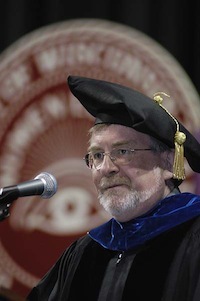After 13 years, Cadwallader steps down from top research post
Over the period of Martin Cadwallader’s tenure as a senior administrator in the Graduate School, the UW–Madison research program has been consistently ranked as one of the nation’s most robust.
In 1990, when first appointed as an associate dean in the University of Wisconsin–Madison Graduate School, geographer Martin Cadwallader had no idea what was over the horizon.
Twenty-four years later, after rising through the leadership ranks and serving for 13 years as dean of the Graduate School and vice chancellor for research, Cadwallader prepares to step down from one of the university’s most critical posts. At the end of August he will return to the faculty and a cherished role as teacher and scholar.
“It was not something I aimed to do,” Cadwallader notes of his epic stint in administration, beginning when he was named chair of the top-ranked UW–Madison geography department in 1989.
As dean of the Graduate School and vice chancellor for research, Cadwallader oversees one of the world’s largest and most dynamic research programs. UW–Madison has 9,400 graduate students in nearly 150 fields of study. The Graduate School budget stands at about $160 million, and the Wisconsin research portfolio is among the largest and broadest of any university, with annual expenditures of nearly $1.2 billion.
During his administrative tenure, such things as human embryonic and induced pluripotent stem cells, and the detection of the Higgs particle emerged from the efforts and collaborations of UW–Madison scientists. The first baby steps in a new field of astronomy were taken with the successful IceCube Neutrino Observatory at the South Pole, and hundreds of other notable discoveries and projects sprang with regularity from the laboratories, workshops and minds of a prolific faculty, staff and students.
”Dean Cadwallader has been an excellent, long-serving steward of our research and graduate education programs,” says UW–Madison Chancellor Rebecca Blank. “He’s provided a thoughtful and steady hand that has helped us maintain our position in the top ranks of American research universities.”
Over the period of Cadwallader’s tenure as a senior administrator, the UW–Madison research program has been consistently ranked as one of the most robust, with research expenditures routinely ranking among the top five of all U.S. universities. The health of UW–Madison’s graduate research and education programs under Cadwallader is reflected by the fact that no fewer than 40 of UW–Madison’s graduate programs rank in the top 10 of their respective disciplines, according to the National Research Council, placing us in the top five nationally.
“I hope we never take our position for granted. I think we’ve been successful largely because of the effort of our students, staff and faculty. We’ve also had a balanced research portfolio, which has allowed us to adapt to changes in the intellectual landscape,” he explains.
“How do you deal with a job this large? You have a good team around you and a structure in which that team can be at its best.”
Martin Cadwallader
Cadwallader also points to a culture at UW–Madison that is less prescriptive of its faculty, encouraging initiative, risk taking and “a respect for different kinds of scholarship.” He sees cross-campus research centers as essential nodes for continued success, noting they can be nimble and have capacity to bring investigators from disparate disciplines together to work on questions of common interest. “The centers are never going to replace departments, but they are going to become increasingly important. Currently, about 20 percent of our research activity flows through the Graduate School centers.”
Large research settings also come with significant challenges, and Cadwallader saw profound shifts in the culture and conduct of research. Sweeping regulatory changes have occurred, and increased scrutiny of things like faculty conflict of interest, and research involving human and animal subjects, and pathogens and toxins, are a new norm.
The graduate education dynamic has also changed. As faculty jobs become rarer, UW–Madison has had to step up its game in terms of preparing graduate students for careers beyond the academy.
“How do you deal with a job this large? You have a good team around you and a structure in which that team can be at its best,” says Cadwallader. “I always felt the most important part of the job was appointing a team with complementary skills and experience and to generate a work environment that facilitates their success.”
Cadwallader plans to return to his faculty post in geography, teach, launch a research project using census data to explore issues of regional migration within the United States — his area of research interest — and write a book on structural equation models in geography.
“There’s the excitement of going back to teaching,” says Cadwallader, “but I will miss working with my colleagues in the Graduate School. They have been a great team and I’m leaving with the satisfaction of knowing that research and graduate education are in excellent shape.”





